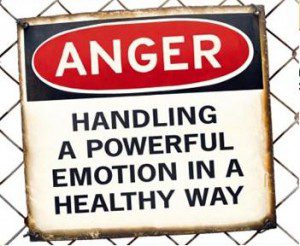Zainab Khan has joined Altmuslim as the site’s newest monthly columnist.
Let me be angry. When I ask you to let me be angry, I’m not talking of anger just to be angry. There’s an anger – for the sake of this article, let’s call it rage – that arises from a lack of will, from being unable to control the appetites. (How often is a person angry just to be angry, really?) I’m not talking about that anger. I’m talking about the anger that arises from hurt, the anger that arises from finally being able to put words to injustice and seeing where it has brought you and more importantly, what it has taken from (or given to) you.
I’m talking about the anger that comes from a refusal to accept defeat, and the anger that precedes the first steps to revolution.
For many of us, anger is a process of self-realization; it comes as the first reaction to understanding injustice. Only once we’re given the time and space to work through our anger, can we make progress.
Somewhere along the way, and I couldn’t tell you when, we began to see anger and rage as one and the same – anger became an innate, static characteristic rather than one part of the larger process of change. And in our conflation of these two very different emotions, we began to dismiss individuals, entire groups and whole movements.
As an undergraduate, I often heard the question, “Why are the SOCs (students of color) always so angry?” Or, if you strip away the political correctness of that question: Why can’t the SOCs be more civilized? When we confuse anger for rage, we disempower and delegitimize anger. How often do we hear the term “Muslim Rage” and see the media paint the Muslim man as crazy, angry, uncivilized and therefore, not worth consideration?
When we belittle, it’s easy to dismiss. When anger is seen as rage, it’s easy to pretend that all anger is unwarranted. Perhaps one of the most shocking consequences of this conflation is that it allows us to excuse ourselves from our own responsibilities. Treating anger as rage directly allows us to reinforce systems of oppression. For example, if anger is taken to be rage, or a silly lack of self-control, civil rights riots become about silly people who lack self-control. And, it’s much easier to dismiss foolish people who lack self-control than it is to dismiss people who are reacting against centuries of oppression and injustice.
Now, I’m about to say something that probably won’t be too popular with many of my readers, but I ask you all to bear with me for a few moments. We need to learn to accept all types of anger (I’ll repeat: anger, not rage). Most of you are probably well acquainted with the anger that arises when the oppressed realize the sources of their oppression, but we need to extend our acceptance of anger to those who are angry when they first react and begin to understand their privilege. (Let’s not build a binary between the oppressed and the privileged – the oppressed are always privileged in some way and the privileged are always oppressed in some way.)
As an undergraduate, I was fortunate enough to live in an atmosphere that constantly challenged every student to come to terms with his/her privilege and oppression. On one occasion, I spoke to a fellow student, Derek (name changed to preserve anonymity), a self-described wealthy, WASP-y, white man about how he confronted his own privilege. Coming from a wealthy background, he was not used to or necessarily prepared to face the economic diversity he found in college.
One day, Derek and a neighbor were working on their computer science homework when Derek jokingly corrected a silly mistake his neighbor made in the homework. His neighbor reacted negatively, shouting that he didn’t need a “rich f***” to tell him how to do his work. Angrily, Derek replied, “Yeah, f*** me! F*** ME and all the other rich people in this world, it’s all our f***ing fault.” Although in retrospect, he was embarrassed for the way he acted, Derek mentioned that it really was not his fault, or choice, that he was born into billion-dollar wealth; and more importantly, it’s his parents who have money and not him.
Derek’s anger could easily be dismissed as rage coming from a spoiled white man. But I’ll argue that just as his middle-class neighbor was reacting to the oppression he faced because of the wealthy, Derek was reacting to the privilege his family’s wealth has granted him. Both Derek and his neighbor were angry, but if Derek hadn’t been allowed to feel angry he probably wouldn’t have had the chance to confront his privilege in a positive way in the future, as he did in his conversation with me, almost a year later. Yes, the anger of the oppressed and the anger of the privileged are different, but they’re both anger nonetheless. We need to remember that this sort of anger is natural and that change occurs only once we allow anger to be felt.
Working through anger is a slow, tedious, and painstaking process. Even still, instead of dismissing anger, we need to let ourselves and others experience anger. The surest sign that someone has eradicated their anger is that they allow others the dignity to work through theirs. The most mature watch, listen, hear, advise but never impede the process.
We need to let people be angry. We always need to let people be angry.
Zainab Khan is a recent graduate of Wesleyan University. Her interests include the South Asian and Middle Eastern diaspora networks, transnational youth movements, and more broadly, fashion and how it operates as a global discourse. You can follow her on Twitter @zaynman















